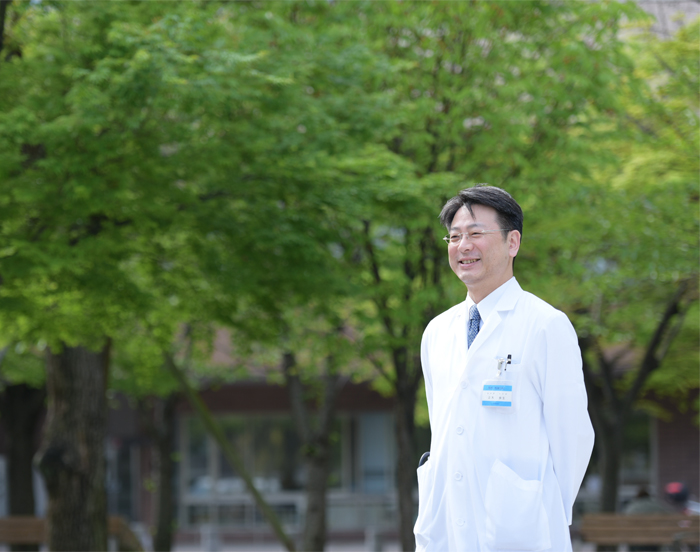

We are often consulted by other departments because of our degree of specialization.
As few medical institutions treat nephrology as a specialty, many patients are referred to us by physicians from various other medical institutions. We have the highest number of outpatients and inpatients in the prefecture. Furthermore, the number of patients with kidney disease will increase in the future, and we believe that early detection and appropriate management of kidney disease are important, as was also shown in last year's chronic kidney disease (CKD) educational activities.
Nephrology health professionals are involved in the long-term treatment of patients. Starting with the diagnosis of proteinuria/hematuria, our department manages everything from the initial stages of kidney disease to the terminal phase, including treatment of kidney disease and the introduction of dialysis and post-dialysis management. In addition, we are often consulted by other departments regarding aging patients and advanced medical treatment options. We use the phrase cardiorenal interaction to describe the correlation between kidney and cardiovascular diseases. As the kidneys deteriorate, patients often develop cardiovascular diseases such as arteriosclerosis. In other patients, the kidneys deteriorate in association with the condition of the body as a whole, and their physicians refer them to the nephrology department if their conditions worsen.
The cohesiveness of our group is strong, and the spirit of mutual cooperation is our motto.
Our team of 40 individuals, including staff, practicing physicians, and graduate students, conducts research, imparts education, and administers treatment.
Cohesiveness is our best characteristic since the establishment of the team. We have mutual respect for each other, and everybody recognizes the spirit of mutual cooperation as our motto.
In our weekly ward conferences and renal biopsy conferences, we share our observations of pathologies and treatment details while expressing our various opinions. Our working environment in the ward (ninth floor of the east building) is improved each year, with the cooperation of health-care professionals and system improvements, including electronic medical records. We manage inpatients using a team system so that somebody is available to respond at all times.
Our work also incorporates many factors related to general internal medicine, not just the kidneys.
Nephrology is an area of internal medicine that implements the three core pillars of urinalysis, blood tests, and renal pathological diagnosis to examine and treat the whole body, not just the kidneys.
Furthermore, the relationship between patients and staff is close, as we must handle the initial response to various diseases and dialysis treatment. Thus, in addition to a high degree of specialization, nephrology also incorporates many factors related to general internal medicine. It is never a department exclusively for the kidneys. For this reason alone, I consider working in the nephrology department to be worthwhile.




